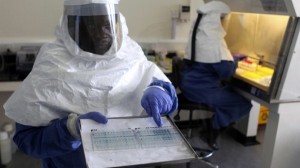Following the first reported case of the Ebola virus in Nigeria, the Nigerian government on Thursday said it had placed 69 people under surveillance and quarantined two others since the first case of Ebola Virus Disease, EVD, was identified in the country.
The Minister of Health, Onyebuchi Chukwu at a briefing in Abuja reportedly said that the 69 people were under surveillance due to their direct or indirect contact with the Liberian- American, Patrick Sawyer, who died from the deadly disease.
Mr. Chukwu said the other two people will remain quarantined for at least three weeks. The long period he said will enable any manifestation of the diseases infection.
The minister said health officials are “still searching” for others who might have had contact with the late Mr. Sawyer; including colleagues and those who flew with him.
He listed those on surveillance to include Mr. Sawyer’s colleagues who travelled to Calabar, Cross River State and hospital staff who treated him before his death.
He also said the Lagos hospital where the deceased died, First Consultants Medical Centre in Obalende, is being decontaminated. “State governments are identifying isolation sites beyond the capacity they had before,” Mr. Chukwu said.
The minister, however, said that the Nigerian borders still remain open with travellers being screened. He also advised the general public to remain conscious of their personal hygiene by regular washing of hands.
He also recommended the use of sanitizers in public buildings to help reduce the sources of contamination.
Since the death of Mr. Sawyer, a presidential committee on communication to manage public knowledge about Ebola, is said to have met three times.
A national call centre which was to be launched in two weeks might become operational earlier than planned to handle toll-free calls for questions and information about the disease.
Ebola is said to be transmitted from fruit bats and apes to humans who hunt them for food and is further spread to other humans when they come in contact with the blood or body fluid of an infected person.
Symptoms include fever, headache, chills, diarrhoea, nausea, vomiting, sore throat, backache, and joint pains. Later symptoms include bleeding from the eyes, ears and nose, bleeding from the mouth and rectum, eye swelling, and swelling of the genitals.



